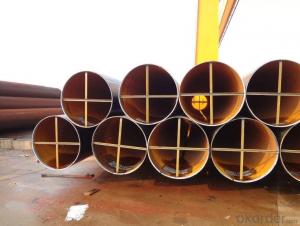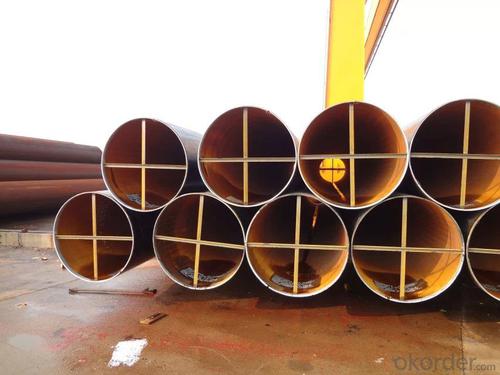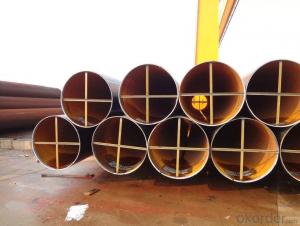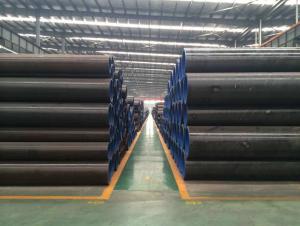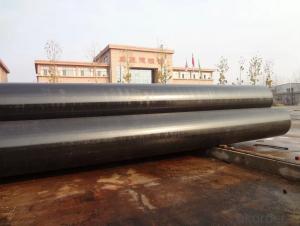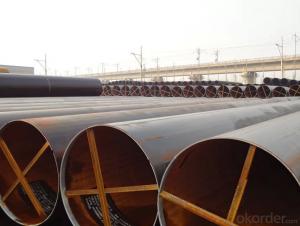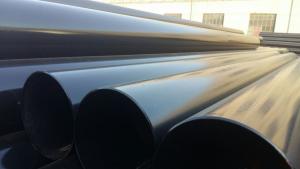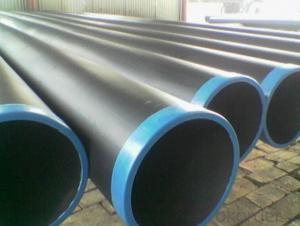Large Diameter Longitudinal Submerged Arc Welded Pipe
- Loading Port:
- Tianjin
- Payment Terms:
- TT or LC
- Min Order Qty:
- 20 m.t.
- Supply Capability:
- 11000 m.t./month
OKorder Service Pledge
OKorder Financial Service
You Might Also Like
Product Description:
1、Structure of Large Diameter Longitudinal Submerged Arc Welded Pipe:
Welded Steel Tube is widely applied to line pipe and casing and tubing in oil transportation and casing field and so on. It is formed by drawing a solid billet over a piercing rod to create the hollow shell. We are company that have many years experience and professional manager team and engineer team and sales team, sure we will provide you high quality of welded pipe and professioanl service.
2、Main Features of Large Diameter Longitudinal Submerged Arc Welded Pipe:
• High working accuracy
• High strength
• Small inertia resistance
• Strong therming dissipine ability
• Good appearance
• Reasonble price
3、Large Diameter Longitudinal Submerged Arc Welded Pipe Specification:
Standard | GB, DIN, ASTM ASTM A106-2006, ASTM A53-2007 |
Grade | 10#-45#, 16Mn 10#, 20#, 45#, 16Mn |
Thickness | 8 - 33 mm |
Section Shape | Round |
Outer Diameter | 133 - 219 mm |
Place of Origin | Shandong, China (Mainland) |
Secondary Or Not | Non-secondary |
Application | Hydraulic Pipe |
Technique | Cold Drawn |
Certification | API |
Surface Treatment | factory state or painted black |
Special Pipe | API Pipe |
Alloy Or Not | Non-alloy |
Length | 5-12M |
Outer Diameter | 21.3-610mm |
Grade | 20#, 45#, Q345, API J55, API K55, API L80, API N80, API P110, A53B |
Standard | ASME, ASTM |
1) Material:20#(ASTM A 106/A53 GRB.API5LGRB,GB),45#,16Mn,10#.
2) Specification range:OD:21.3-610mm,WT:6-70mm,length:6-12m or according to the requirement of clients.
3) Excutive standards:GB,ASME API5L.ASTM A 106/A53,Despite of the above standards,we can also supply seamless steel pipe with standard of DIN,JIS,and so on,and also develop new products according to the requirements of our clients!
4) Surface:black lacquered,varnish coating or galvanized.
5) Ends:Beveled or square cut,plastic capped,painted.
6) Packing:bundles wrapped with strong steel strip,seaworthy packing.
4、Packaging & Delivery
Packaging Details: | seaworthy package,bundles wrapped with strong steel strip |
Delivery Detail: | 15-30days after received 30%TT |
5、FAQ of Welded Steel Tube:
①How is the quality of your products?
We have many years business experience in this area, and we have professional engineer and manager team and sure we can provide you high quality production and professional service.
②How about price?
Please trust the quotation we would give you, it is professional one.We quote as lowest as possible for any customer.Don't waste your time if you are not agree with our price.
③Why should you chose us?
Our service formula: good quality+good price+good service=customer’s trust. We will do our best to provide you good service.
6、 Large Diameter Longitudinal Submerged Arc Welded Pipe Images:
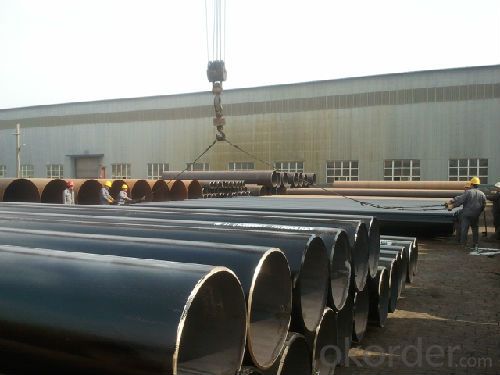
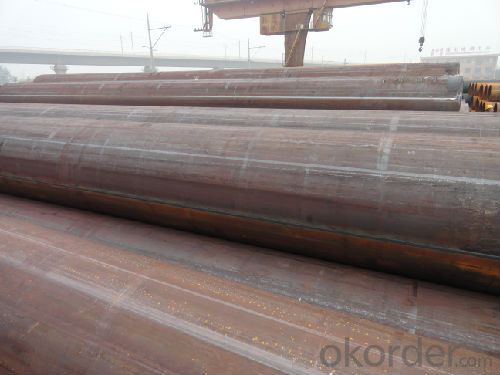
- Q: How are steel pipes threaded for connection?
- Steel pipes are threaded for connection using a threading machine that cuts grooves into the pipe's outer surface. The machine rotates the pipe while a die cuts the threads, creating a spiral pattern. This threading allows pipes to be securely connected by screwing them together, providing a tight and leak-free joint.
- Q: How do steel pipes compare to other materials, such as PVC or copper?
- Steel pipes are generally more durable and have a higher resistance to heat, pressure, and corrosion compared to PVC or copper pipes. They are commonly used for applications that require strength and longevity, such as in industrial settings or for transporting high-pressure fluids. However, steel pipes can be more expensive and heavier than PVC or copper, making them less suitable for certain residential or lightweight applications. Ultimately, the choice of material depends on the specific requirements and budget of the project.
- Q: What is the average lead time for manufacturing steel pipes?
- The average lead time for manufacturing steel pipes can vary depending on several factors such as the size and complexity of the order, production capacity, and current demand. However, it typically ranges from a few weeks to a few months.
- Q: How are steel pipes affected by international trade policies?
- Steel pipes can be significantly impacted by international trade policies. Trade policies, such as tariffs or quotas, can increase the cost of importing steel pipes, making them more expensive for domestic consumers. On the other hand, trade policies that promote free trade can lead to increased competition and potentially lower prices for steel pipes. Additionally, trade policies may also affect the availability of certain types of steel pipes, depending on the regulations and restrictions imposed by different countries. Overall, international trade policies play a crucial role in shaping the market dynamics and influencing the supply, demand, and pricing of steel pipes.
- Q: How are steel pipes protected from corrosion in corrosive environments?
- Steel pipes are protected from corrosion in corrosive environments through various methods such as coating the pipes with corrosion-resistant materials like epoxy or zinc, using cathodic protection techniques, and implementing regular inspections and maintenance to identify and address any potential corrosion issues.
- Q: Can steel pipes be used for underground drainage in acidic soils?
- Yes, steel pipes can be used for underground drainage in acidic soils. However, it is important to consider the type of steel used and the corrosion resistance properties to ensure longevity and prevent potential damage from the acidic environment. Additionally, protective coatings or linings can be applied to the steel pipes to enhance their resistance to corrosion in acidic soils.
- Q: What is the hardness of steel pipes?
- The hardness of steel pipes can vary depending on the specific grade and manufacturing process. Generally, steel pipes are made from alloys that provide a combination of strength and toughness. To determine the hardness of steel pipes, various methods such as Rockwell or Brinell hardness tests can be conducted. These tests measure the resistance of the steel to indentation or penetration by a standardized indenter. The hardness of steel pipes is typically expressed as a numerical value on a scale, such as the Rockwell hardness scale (e.g., HRC or HRB) or the Brinell hardness scale (e.g., HB). The hardness of steel pipes is important as it indicates their ability to withstand physical stresses, such as pressure, impact, or wear, in various applications such as construction, oil and gas transportation, and manufacturing.
- Q: What are the different grades of steel used in pipes?
- There are several different grades of steel used in pipes, including carbon steel, alloy steel, and stainless steel. Carbon steel pipes are commonly used for general-purpose applications, while alloy steel pipes are often used in high-temperature and high-pressure environments. Stainless steel pipes are known for their corrosion resistance and are frequently used in industries such as chemical, food processing, and pharmaceuticals.
- Q: Can steel pipes be used for LNG terminals?
- Yes, steel pipes can be used for LNG terminals. Steel pipes are commonly used in the construction of infrastructure for LNG terminals due to their strength, durability, and resistance to extreme temperatures. They can effectively handle the high-pressure requirements and the cryogenic temperatures involved in the storage and transportation of liquefied natural gas.
- Q: What are the factors to consider while selecting steel pipes for a project?
- When selecting steel pipes for a project, there are several important factors to consider. These factors include the material composition of the steel, the pipe dimensions, the intended application, the environmental conditions, and the budget. 1. Material Composition: The material composition of the steel pipes is crucial as it determines the pipes' strength, corrosion resistance, and durability. Common types of steel used for pipes include carbon steel, stainless steel, and alloy steel. Each type has its own set of properties and is suitable for different applications. 2. Pipe Dimensions: The dimensions of the steel pipes, such as diameter and wall thickness, should be carefully considered. The pipe dimensions must be compatible with the project requirements and the system in which the pipes will be installed. It is essential to ensure that the selected pipes can handle the required flow rates and pressures. 3. Intended Application: The specific application of the steel pipes should be thoroughly assessed. Different projects may require pipes with varying characteristics, such as heat resistance, pressure resistance, or the ability to transport specific substances like gas, oil, or water. Understanding the application requirements will help in choosing the appropriate type of steel pipes. 4. Environmental Conditions: The environmental conditions in which the pipes will be installed must be evaluated. Factors such as temperature variations, exposure to moisture, corrosive substances, and external pressures should be taken into account. For instance, if the project involves underground installation or exposure to corrosive chemicals, corrosion-resistant steel pipes may be necessary. 5. Budget: The budget available for the project is also an important factor to consider. The cost of steel pipes can vary depending on their material composition, dimensions, and additional features. It is crucial to strike a balance between the project requirements and the available budget to ensure cost-effectiveness without compromising the quality and performance of the pipes. In conclusion, when selecting steel pipes for a project, it is important to consider factors such as the material composition, pipe dimensions, intended application, environmental conditions, and budget. By carefully evaluating these factors, one can choose the most suitable steel pipes that meet the project requirements and ensure long-term performance and durability.
Send your message to us
Large Diameter Longitudinal Submerged Arc Welded Pipe
- Loading Port:
- Tianjin
- Payment Terms:
- TT or LC
- Min Order Qty:
- 20 m.t.
- Supply Capability:
- 11000 m.t./month
OKorder Service Pledge
OKorder Financial Service
Similar products
Hot products
Hot Searches
Related keywords
